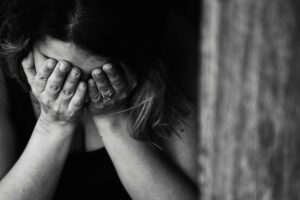 “I’m feeling fat.” How often have I said that to myself? Usually I follow that statement with a litany of everything that’s wrong with the way I eat. What I do with food, how “bad” I was when I ate (fill in the blank), that I must change how I eat so I can lose weight and then everything will be great. Then I pump myself up with promises (“here’s what I’m going to do to FIX this”).
“I’m feeling fat.” How often have I said that to myself? Usually I follow that statement with a litany of everything that’s wrong with the way I eat. What I do with food, how “bad” I was when I ate (fill in the blank), that I must change how I eat so I can lose weight and then everything will be great. Then I pump myself up with promises (“here’s what I’m going to do to FIX this”).
I end up eating again because I continue to act the same way, despite the promises, or give in to the despair and stuff myself to feel better about feeling fat. (Only a food addict will tell themselves that bingeing will make them feel better about feeling fat!) That’s my best thinking, and it doesn’t change the way I act.
“Feeling fat” is a lie I’m telling myself. I’m really not feeling fat. I’m feeling a lot of self-hatred and despair because I can’t control myself.
When I feel despair about what I do with food, that’s because I believe that I can control my food and fix myself, so I’m just totally screwing up and will have to try again (or just give up). If you’re feeling desperate, appalled and depressed about how you live with food, then you believe that somehow you can fix your actions with your thinking.
Notice two words in that last sentence: “believing” and “thinking.” We food addicts tell ourselves lies all the time about what we think and how we act with food. It’s addictive thinking that has nothing to do with reality, it just enables us to keep eating. For example:
I can have just one
In that moment, I believe I can have just one. I believe it with every thought. In that moment, there’s no room for any other thought or belief. I tell myself a lie (because I can’t eat just one) that I totally believe. Then I act upon that thinking: I eat one (and another, then another and then the horror begins). The moment I believe I can have just one is the moment I am powerless.
How can I stop myself from believing I can have “just one” at that moment when I’m about to eat something that will make me go insane for days, weeks, months or years? In the AA Big Book, they call this a “strange mental blank spot.” They also call it “just plain insanity.” We believe something that has NO basis in fact.
It’s a delusion, and food addicts have it. We have it when we’re happy, sad, angry, scared, any time at all. I’m as likely to have that belief at a celebration as at a funeral. And the results are always the same.
When I can accept that my thinking is fatally flawed (after all, this disease will kill me), then, paradoxically, I’m on the way to recovery. Because there is a solution, and it starts with changing my mind. It is, as the Big Book says, a psychic change.
Almost everything we believe about ourselves and our food when we come into recovery is wrong. We need a lot of help to recognize our addictive thinking and start dismantling the lies we tell ourselves. It’s a long-term process and it starts, of course with getting abstinent. During ACORN’s Primary Intensive©, we focus on helping food addicts to do just this, because this is at the core of Step One: abstinence and acceptance.
Accepting that we are powerless over food is the most powerful thing we can do.
Believe it or not, this is GREAT. Because when you can see that being powerless is the truth, you won’t end up in the food. You don’t have to take on the horrible responsibility of trying to fix yourself by yourself because you know, fundamentally, that it’s not possible. You don’t have to keep trying and failing, over and over again. You can let that whole “feeling fat” litany just go.
It’s a totally different way of thinking, isn’t it? Acceptance is very different from despair. In the recovery rooms, there’s a saying: “Awareness, acceptance, action.” They all go together, in order, for real healing to happen.
Of course, acceptance is not enough. I have to take action, otherwise nothing changes. If all the changes I’ve made by myself to fix myself haven’t worked, what could I possibly do differently?
I believe I’ve tried everything. (There’s that word again: “believe”). That’s the lie I tell myself, because I’ve really tried only what I wanted to try. Everything else, of course, “wouldn’t, or didn’t work.”
Time to let go. Let go of thinking that you know everything about how to be “normal” with your food. You may believe that, but the fact is nothing you know has helped you. So, consider: you may be (gasp!) wrong.
The action we need (we may not want to, that’s for sure!) to take is accepting help from other people. It’s not help on my terms: it’s following directions from someone who understands food addiction and has experience in being abstinent. After awareness, acceptance and action comes: willingness.
Now you are truly moving through Step One: I am aware that my thinking about food is fatally flawed, I accept that I am a food addict and this is how my thinking works, and finally, I am taking the action of getting help and being willing to follow directions.
Congratulations! You won’t have to “feel fat” any more.
